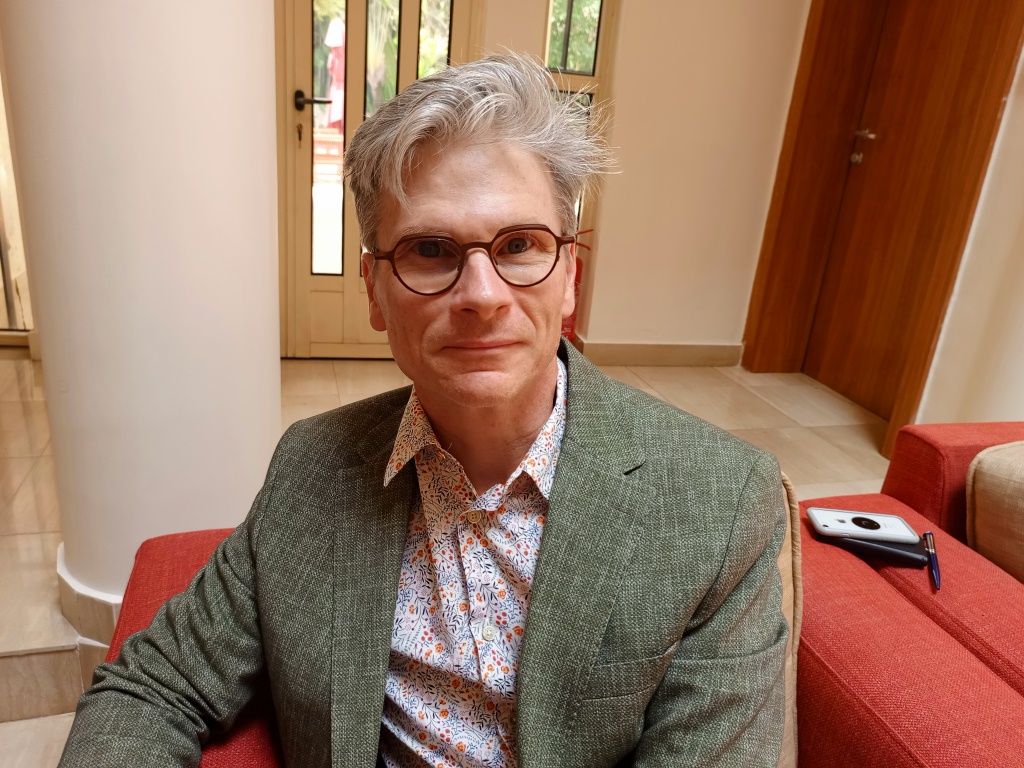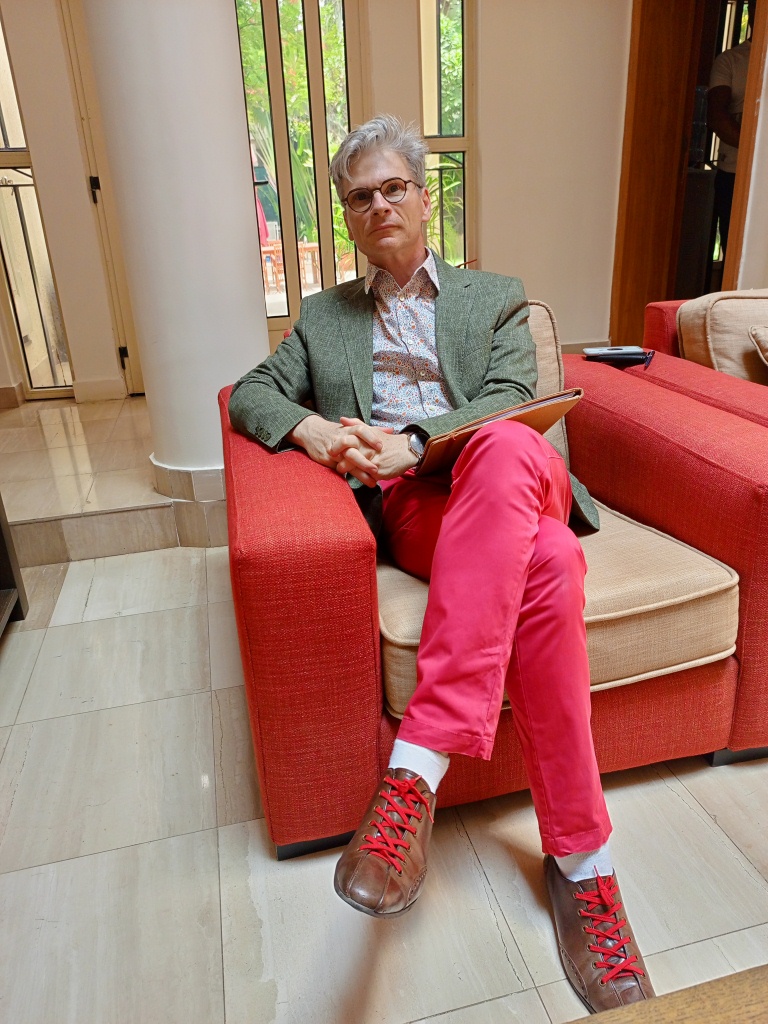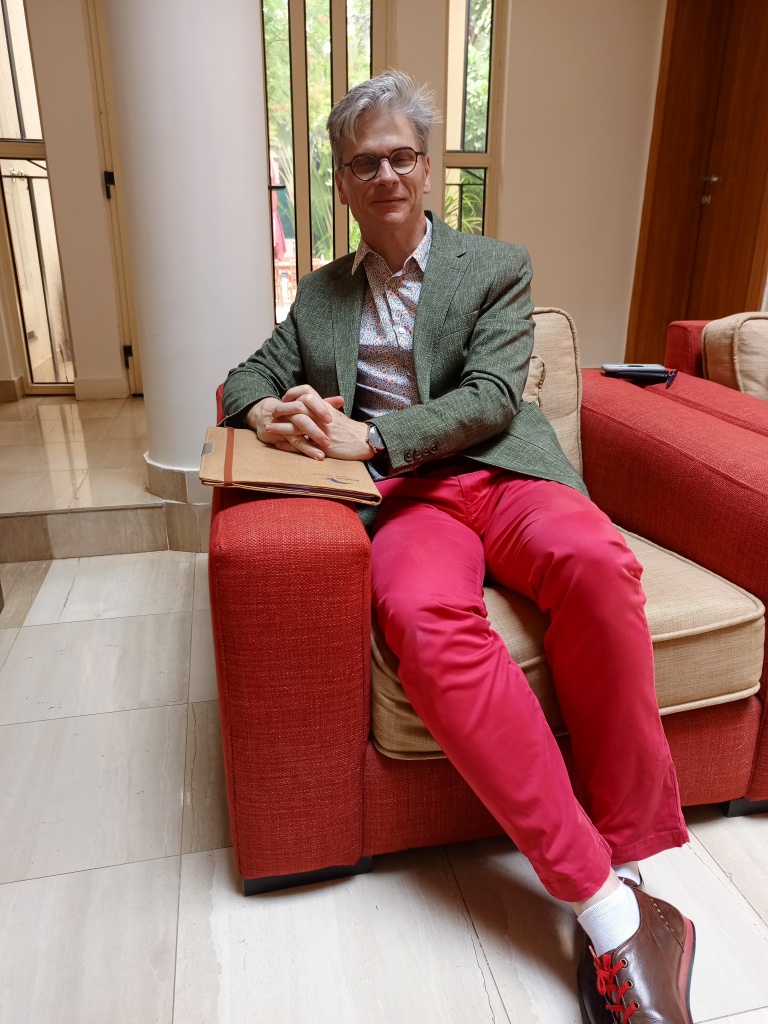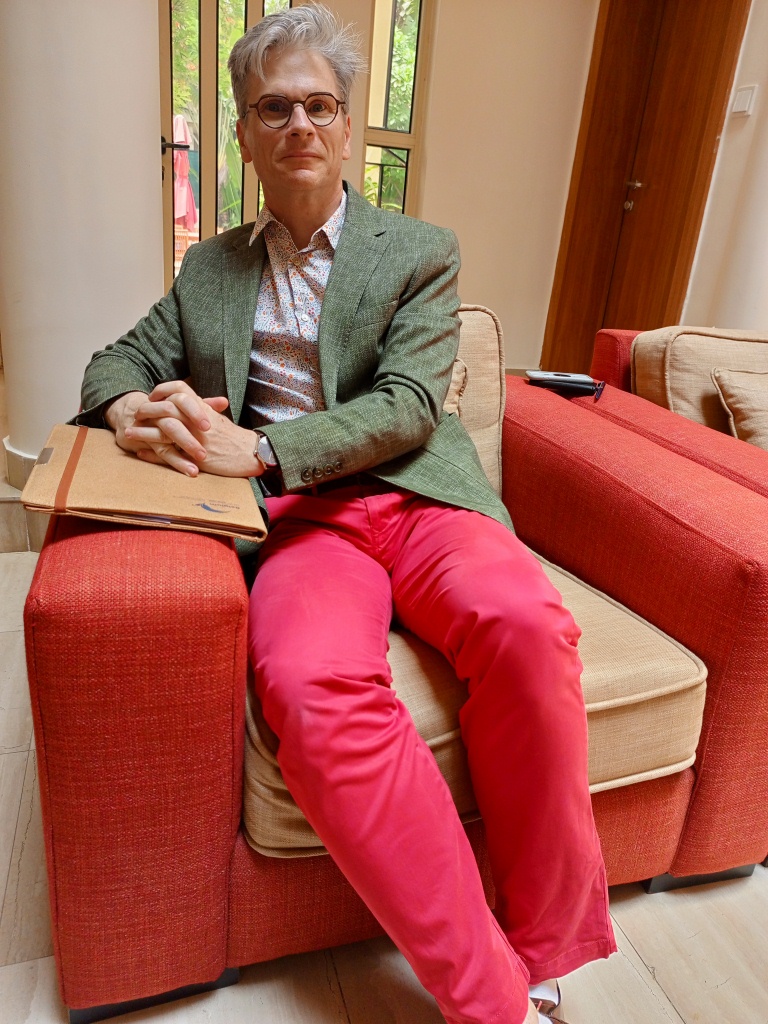
Belgian Ambassador to Nigeria, Mr. Pieter Leenknegt is a very warm diplomat and a good personality to meet. He was Deputy Head of Mission at the Belgian Embassy in Nairobi, Kenya, as well as Belgium’s Deputy Permanent Representative to the United Nations Environment Program (UNEP) in Nairobi. During previous postings, Mr. Leenknegt was heading the Belgian Diplomatic Representation in Kabul, Afghanistan and serving as a delegate to the WTO, the UN and its Specialized Organizations at the Belgian Permanent Representation in Geneva. He was a member of the Belgian delegation during various negotiation rounds of the Minamata Convention on Mercury (2011-2013) and the Nagoya Protocol on Access and Benefit-Sharing to the Convention on Biological Diversity (2010).
In an exclusive interview that lasted for more than one hour with Sunday Oyinloye, Publisher, Green Savannah Diplomatic Cable, the Ambassador speaks about relations between Belgium and Nigeria, the forth coming Nigeria Belgium Luxembourg Business Forum, what makes Belgium unique , his perception of Nigeria, why applicants are sometimes denied visas , and other topics of interest about the two countries
Excerpts:

Belgium is strategic to the economic development of Nigeria, what are you doing to promote trade between the two countries?
As a general backdrop, I will say it is the usual lots of incoming and outgoing trade missions that get articulated in different ways. What we see in Brussels, mostly involves the Nigerian Embassy in Brussels and the Chamber of Commerce in Belgium; they organise Business Forums. We are happy to be partnering with very enthusiastic and dynamic partners. The Secretary General of CBL-ACP, Belgium, Thomas De Beule has a strong heartbeat for Nigeria and that is a major asset because his Chamber deals with many countries, but Thomas has soft spot for Nigeria. Nigerian Embassy in Brussels has always been part of this as well because they know more than anyone else how to help Nigerians businesses in Belgium and where the opportunities lie. Another interesting new feature of this Business Forum is that the Abuja Chamber of Commerce is also part of it. We have always been having trade missions from Belgium to Nigeria. The last of such trade missions was a compact one and it was to Lagos in January. It was a self-organised trade mission to Nigeria. It involved eight companies in the field of waste management, water treatment, food storage, and renewable energy. They teamed up and came here; they weren’t very keen to have business to government meetings. They selected the Nigerian enterprises they wanted to meet. They also invited me there. As an Embassy we can always play a role. As an Embassy, we are supposed to know all of the contact points and everybody in Belgium that has interest in Nigeria, so we are match makers. My biggest task is not necessarily in getting companies directly from Belgium, they could find ways of contacting Nigerian businesses and organize trade missions like the one they had in January. We as an Embassy or as an Ambassador, we focus on economic diplomacy. There might be businesses that might want to get in touch with government. If I am attending any meeting between Belgium and Nigerian companies, it means I somehow attach my seal of approval about the Belgian company . Let me also add that part of my work is to travel to what I will call promising states. I am not just travelling like a tourist. When I travel in Nigeria, I go and look for places where I have the impression that Belgium actors could make a difference. And I will say part of my brief here is this. We are going to scale up our presence in Nigeria. We will have a new chancery building (not the residence) for the Embassy. We will move out of where the Embassy is presently located to a place where we are currently constructing within the European Union Compound.

Inside the EU compound?
Yes, within the EU compound, there is still a lot of space there. Ireland is currently building and we are the next in line. Then other ones will follow
Does it mean that those who want to obtain Visa will be going there?
You are absolutely right. We have thought about that as well. That activity is a big chunk of the work of our Embassy. That also has to do with trade because for trade to flourish, businessmen have to be able to travel. Let me add that we are also representing the Netherlands in handling of visa here in Abuja and so, in the new construction, there will be separate entrance for visas.
Some years back, I asked the Netherlands Ambassador to Nigeria why Belgium is processing Visas for them, I want to ask you same question today?
I hope my answer will be the same as his. If you look at those who are traveling from Nigeria you will discover that more people are traveling to the Netherlands than Belgium. Yet the logic of the arrangement lies in a wider, global understanding. Throughout the world, in most cases the Netherlands are representing Belgium or making office available in their Embassy buildings and in some cases it is the other way round. So we offer that service for the Netherlands here in Abuja. In Lagos, the Netherlands are represented by France for visas. This is part of global deal of Benelux countries (Belgium, the Netherlands, and Luxembourg.) Luxembourg is a small country, so diplomatic representation of Luxembourg is usually is being carried out by the Netherlands, and consular representation by Belgium. And so it happens between the Netherlands and Belgium: Caribbean citizens who want visas for Belgium do so through the Netherlands Consulate in those Caribbean Islands
In general terms, why are Nigerian applicants sometimes denied visas?
There can be several reasons for that. With Schengen countries, we have a common visa system. If someone has earlier been denied visa by a Schengen country, we check for the reason for the denial, based on that, we decide whether or not the reason was serious enough to deny again. Many denials are repeat denials because somewhere at some stage, in one of the Schengen countries there was a non-credible visa files. I’m sorry but we have to be candid about it, this is a country (Nigeria) that is far more prone to fraud with official documents than almost anywhere else in the world. There are all kinds of falsified documents, sometimes documents issued by competent authorities but still false, sometimes forged documents. The Embassy also has what we call verification officer who full time goes to check whether information is genuine or not. So if we have to explain why visa rejection rate in Nigeria is a bit higher than in certain other countries, it is a direct consequence of falsified documents.

Is Belgium having higher refusal rates for Nigerian applicants than other Schengen countries?
The answer is no. We have exactly the same level of visa refusal rate as France, an,d comparable ones to other neighboring countries of ours and other Schengen countries. Fraud is one thing, other reasons might also be that the applicant, a tourist for instance leaves us in doubt about his ability to sustain himself during the trip. Sometimes we have the impression that some applicants don’t have enough money to meet basic needs like hotel and other costs during their stay. That will also be of consideration whether or not the visa will be granted by the Schengen capitals. People should be aware and mindful of what their level of expenses is going to be. This is not peculiar to Nigeria. We have our way of finding out the authenticity of any statement of account submitted by applicants
Would you like to give us an insight into what Belgian businesses are doing in Nigeria because once the name Belgium is mentioned in this country, what come to mind of most Nigerians are second hand goods?
That is not entirely right. I guess what plays there is what we call Port of Antwerp in Belgium. Many of the second hand cars for Nigeria come through the port of Antwerp. Those goods sometimes come from other countries, but they are shipped to Nigeria from the Port of Antwerp, so people call them “Belgium”. However, we are still lucky; it could have been called “Netherlands” because they have a big port in Rotterdam where goods are also shipped to different parts of the world. I guess probably when it comes to second hand cars, we have an edge. Let me say that everything about our trade with Nigeria is not all about second hand goods. But the fact that you mentioned Belgium used cars is useful to understand some of those or general trade statistics. The bulk of the export from Belgium to Nigeria is refined petroleum. The volume is staggering, and explains to some extent why Belgium totalizes on its own around 40% of total EU exports to Nigeria and why Belgium is one of the rare EU Member States with a trade surplus vis-à-vis Nigeria. Everything else is much smaller in volumes. In 2022, there was enormous increase in export from Belgium to Nigeria which stood at 7.564 billion EUR. However, in 2023 export from Belgium to Nigeria dropped to 4.8 billion EUR. Nigeria’s export to Belgium in 2022 was 517.95 million EUR. It went down to 277.84 million EUR in 2023. But, I am not certain that all of this oil was refined in Belgium, probably the last phase of value addition happened in Belgium – likely in or around the Port of Antwerp – and them it gets qualified as Belgium product. We also export pharmaceuticals to Nigeria and some of these pharmaceutical companies have shown interest to start producing in Nigeria. Other products that are being exported to Nigeria from Belgium include plastics, machineries, household appliances, and so on. You have to bear in mind that these volumes are rather small; we are not talking about billions of euros here. Interestingly, one of these five or six top exports is cocoa-based finished goods – Belgian chocolate. That brings me back to the other direction; Nigeria exports crude oil to Belgium. Nigeria also exports cocoa, semi-precious stones and fertilizer. The story of cocoa is interesting because there has been increase in export of cocoa to Belgium. Again, the good thing is that we now source more cocoa from Nigeria, not just from Ivory Coast and Ghana which have been traditional sources for our chocolate making brands. In a few weeks, there is going to be exchange of expertise organized by Egmont, the think tank of our Ministry of Foreign Affairs involving diplomats and high level officials from the ten biggest cocoa producing countries in the world including Nigeria.
We talked about trade figures so far. But when it comes to what Belgium businesses are doing in Nigeria, it is relatively unrelated to oil and gas. We have a big dredging presence here. Some of the dredging has to do with Bonny Canal. The Port of Antwerp also have some activities and interests here in Nigeria, not just in the maritime ports but also inland ports such as the port of Onitsha . They have a permanent presence there; they offer some services and also thinking of hinterlands development, connecting inland with maritime ports and onward roads and logistics. They have a lot of expertise in this area. There is a possibility of upscaling that in the coming years. Other activities involve transportation of chemicals and shrimp fishing logistics. We also have few Belgian companies that are building roofing materials locally for the local market and perhaps for exportation in the nearest future. These Belgian companies offer employment to hundreds of Nigerians. The biggest employer until recently was a palm oil plantation in Edo State which has now become Nigerian controlled. We have Belgian companies in Lagos, Enugu, but a smaller presence in Abuja in terms of employment compared to the south of the country. The truth is that the trade statistics is not telling the whole story, because it looks like everything is all about oil and gas. Some Belgian companies have been here for five to six decades and there are few new actors at the door step, mostly SMEs with topnotch expertise who can deliver on vaccines, bandages, specific treatment for illnesses, specific machineries to deal with diseases, and topnotch machines for waste recycling. We also have companies that are about to start decontamination of soil. In so many areas where Nigeria is looking for specific expertise, Belgians are available.

What are the challenges hindering investment ties between Nigeria and Belgium?
When it comes to trade, let me start with the most trivial thing but still very important. We don’t have a direct air link between Belgium and Nigeria. A decade and half ago, there was still direct flight from Lagos to Brussels. I know that some people might be interested in running it again. There are some advantages of direct flight between two countries. I noticed that when I was in Nairobi, Kenya. As soon as we had direct flight between Nairobi and Brussels, immediately there were additional exchanges. In terms of hindrances vis-a-vis the existing trade, from inwards trade and investment from Belgium to Nigeria, it is mostly governance related issues; sanctity of contracts. We have had issues over the past decades where contracts are not honoured, partners not paid for services that were provided or for the goods that were traded or where shipment of goods got wasted by the military regime and nobody owns up for the loss afterwards. So we sometimes have hard times convincing Belgium companies. There is a trust issue. This is still not the most trusted place on the globe. We have to be candid about it, but there is room for improvement. Belgium on its end could increase the number of high-level visits to Nigeria (members of government and officials). When it comes to outward trade, we have so many foreign firms importing into and investing in Belgium, one of the most open economies in the world. However what I hear often is about the standard of Nigerian products not able to meet the standards set for the European market. There again, we can have some solutions. For instance University of Ghent has launched collaboration with Nigerian Universities. They are working on how to ensure that Nigerian products comply with the phytosanitary requirements of the European market. Most of the hindrances you will find for Nigerian products entering Belgium are mostly the same with other EU countries because the requirements are basically the same. Some of these standards are generally related to human health. But let me say that the problem is not peculiar to Nigeria. For instance, peanuts from other countries in West Africa have the same issue getting into Europe. So, it is in everybody’s interest to let their products be standard because in many cases they have comparative advantage on these products over Europe. They just need to scale up the standards. I visited an emergency food factory in Kano state; they also told us that for simple mixture where they use peanuts, some vegetable oil and other components, more than 60 percent of the components are from outside of Nigeria because of standards issues. That may also mean that Nigeria might be a little worse off in terms of how it has been able to cope with its agricultural quality standards than some of its neighbors. And that may be partly because of so much energy and focus on oil and gas while agriculture has been relatively neglected. But Nigeria can overcome it.
What message do you have for Nigerians concerning the forthcoming Nigeria Belgium Luxembourg Business Forum which will hold in Brussels in September?
I have two messages. The first one will be that they will meet with the right expertise and partners in Belgium. They will meet partners that are well connected at all levels. The second message is a message of hope. It is possible not only for Nigerian companies to trade with Belgium, it is also possible for them to invest in Belgium companies .For instance a Nigerian Saro Africa bought the Belgian SIAT group, and thereby also acquired ownership of a Belgium-based horticultural firm, something I will say is rather new in our bilateral relation. It passed almost unnoticed in the Nigerian press so far.
So more Nigerian companies can buy Belgian companies if they wish?
Yes, absolutely. It’s a natural thing. This is 21st century. There is globalization. In the 80s and 90s, Chinese and Japanese got foothold in Europe, it won’t stop there, let Africans do same
In what areas would you like to see improvement in relations between Belgium and Nigeria?
What will lead to bigger volumes and bigger numbers of Belgium’s presence in Nigeria and vice versa. Predictability and ease of business issues play an important role in investment. Another area we will like to see an improvement is on migration. We had the Director of Migration visiting Nigeria at the end of January, in the first place to reconnect after a long period because of COVID. It was also to pass a message that we are still faced with a lot of irregular migration from Nigeria mostly from Edo State and Rivers, not areas that are prone to conflict of any kind, but people just want to japa for greener pastures. We have to make these things work better; unfortunately the cooperation we have enjoyed from Nigeria on this has been a bit suboptimal of late. We have a regulatory framework with Nigeria since 2015; a memorandum of understanding, so the groundwork has been done, but its implementation has not been working the way it should. So, there is a lot of room for improvement. Usually when we identify a Nigerian in Belgium for using our asylum procedures with non-genuine stories, we know how to identify these people but we still need the cooperation of the country of origin, which has sometimes been a challenge. During my tenure here, I will try and smoothen whatever we can to make that work better
What are those unique things about Belgium?
An interesting similarity between Belgium and Nigeria is that we are both Federal States. And you might be surprised to know that Belgium a country with 11 million people is also a federation which makes it easier for diplomats of the two countries to understand each other and also to understand the limitations and the advantages that federalism brings. Another unique thing about Belgium is that we have the highest density of castles per capita. Most of the castles were built by non-Belgians. They were built by the French, Spanish, and sometimes by local people during the period we were colonized by other European countries. Perhaps, something some Nigerians might probably have heard of is the Belgium colonization of Congo and the mandate it had on Rwanda and Burundi. But before that we have been colonized ourselves for centuries by the French, Spanish, Austrians and the Dutch; while the British guaranteed our existence in 1830 as a buffer state, fifteen years after Napoleon lost out against the European allied forces, which also took place on Belgium’s soil. Waterloo sounds like a British name, but it is a village in Belgium where wars that had convulsed Europe since the French Revolution ended.
As a Diplomat serving in Nigeria, what are your thoughts about the country?
From singing, spoken words, cinema, I will say Nigerians are the Italians of Africa. Nigerians are very expressive. For instance, if you ask a school kid of certain age in Kenya to perform in front of a large crowd, the effect is not going to be the same if you ask a Nigerian kid to do same. In my very first week in Nigeria, I attended an event at the Ministry of Education where Primary pupils were put on stage to perform some sketches. They were bold, and the only concern was how to keep the microphone far enough from their mouth so that they won’t be shouting too loud. I think it’s a big asset; Nigerians have absolutely no fears to make themselves heard at debates, on radio or television. There is no dull moment. What I didn’t expect before coming to Nigeria was to find so many traditional kingdoms, though there are no forms of powers involved, some of these people wield a lot of influence over local inhabitants. From my own experience, I find it extremely helpful and extremely accommodating. For instance, If you go and visit a traditional ruler, you will end up knowing so much about their place that it will become almost useless to buy written travel guide. You can get that wealth of information as a guest of traditional ruler.
How do you see the future of economic ties between the two countries?
There is potential for more. We can upgrade some things. There are many exchanges going on. To me, it looks like investment gives a better picture of what we are heading for than the trade figures. We have to see our trade relations beyond fossil fuel. At some point, there will be an end to fossil fuel and then we still have to ensure that we will be there for each other. And there are many ways that we can be there for each other. There are so many sectors that could be developed between our countries, also in the cultural, artistic and technological fields. Many things are possible.









